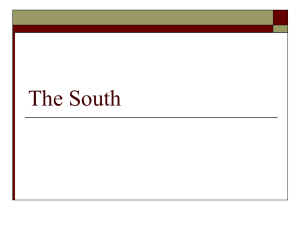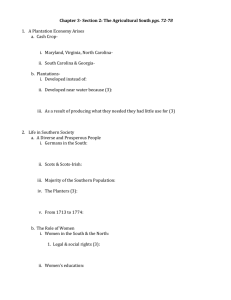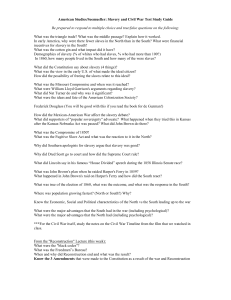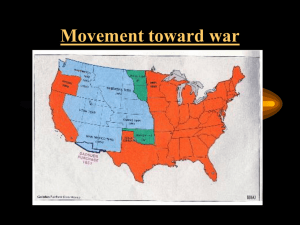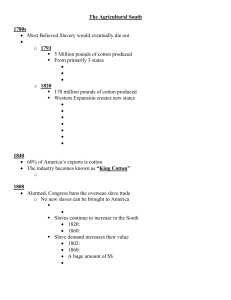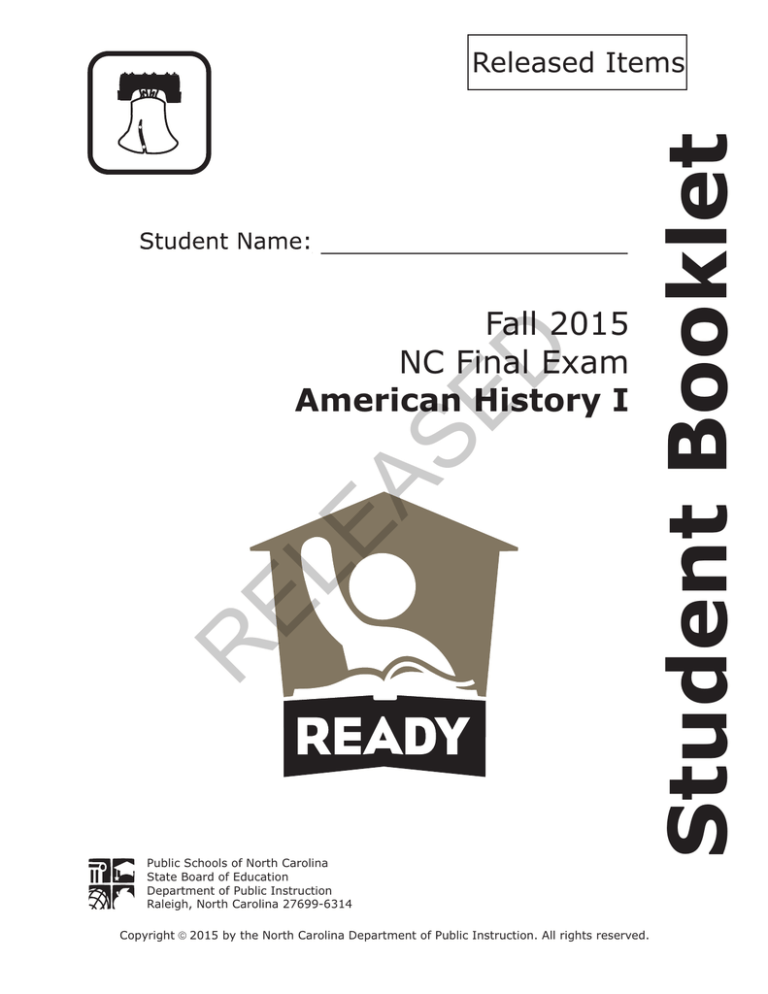
R
EL
EA
SE
D
Fall 2015
NC Final Exam
American History I
Public Schools of North Carolina
State Board of Education
Department of Public Instruction
Raleigh, North Carolina 27699-6314
Copyright ã 2015 by the North Carolina Department of Public Instruction. All rights reserved.
Student Booklet
Released Items
AMERICAN HISTORY I — RELEASED ITEMS
The great rule of conduct for us in regard to foreign nations is in extending our
commercial relations, to have with them as little political connection as possible.
So far as we have already formed engagements, let them be fulfilled with perfect
good faith. Here let us stop. Europe has a set of primary interests which to us
have none; or a very remote relation. Hence she must be engaged in frequent
controversies, the causes of which are essentially foreign to our concerns. Hence,
therefore, it must be unwise in us to implicate ourselves by artificial ties in the
ordinary vicissitudes of her politics, or the ordinary combinations and collisions of
her friendships or enmities.
D
Why forego the advantages of so peculiar a situation? Why quit our own to stand
upon foreign ground? Why, by interweaving our destiny with that of any part of
Europe, entangle our peace and prosperity in the toils of European ambition,
rivalship, interest, humor, or caprice.
SE
George Washington, Farewell Address, 1796
Courtesy of The Avalon Project at Yale Law School
EA
In his farewell address, how did George Washington attempt to influence the
foreign policy of the United States?
He advised the nation to favor those countries with commercial ties to the
United States.
B
He encouraged politicians to promote a foreign policy of imperialism.
C
He recommended a policy of neutrality with other nations.
D
He advocated for an alliance with European nations.
EL
A
R
1
1
Go to the next page.
AMERICAN HISTORY I — RELEASED ITEMS
2
American Party Platform (1856)
Americans must rule America; and to this end native-born citizens should be
elected for all State, Federal and municipal offices of government employment, in
preference to all others.
Persons born of American parents residing temporarily abroad, should be entitled
to all the rights of native-born citizens.
SE
D
No person should be selected for political station (whether of native or foreign
birth), who recognizes any allegiance or obligation of any description to any
foreign prince, potentate, or power, or who refuses to recognize the Federal and
State Constitutions (each within its sphere) as paramount to all other laws, as
rules of political action.
EA
The unequaled recognition and maintenance of the reserved rights of the several
States, and the cultivation of harmony and fraternal good-will between the citizens
of the several States, and to this end, non-interference by Congress with questions
appertaining solely to the individual States, and non-intervention by each State
with the affairs of any other State.
EL
How did the American Party respond to the immigration of Germans in the
Midwest and Irish in the East?
It built low-cost government housing projects to accommodate the influx of
European immigrants.
B
It called for the exclusion of people born outside of the United States from
voting or holding office.
C
It created education and job-training programs to help immigrants integrate
into American society.
D
It proposed an amendment to make English the national language and ban
the speaking of foreign languages.
R
A
2
Go to the next page.
AMERICAN HISTORY I — RELEASED ITEMS
In a response letter to John Holmes in April 1820 concerning the Missouri
question, Thomas Jefferson wrote:
D
This momentous question, like a fire bell in the night, awakened and filled me with
terror. I considered it at once as the [death] knell of the Union . . . but this is a
reprieve only, not a final sentence. A geographical line, coinciding with a marked
principle, moral and political, once conceived and held up to the angry passions of
men, will never be obliterated; and every new irritation will mark it deeper and
deeper . . . the cession of that kind of property, ... would not cost me in a second
thought, if ... a general emancipation ... could be effected ... but, as it is, we have
the wolf by the ear, and we can neither hold him, nor safely let him go. Justice is
in one scale, and self-preservation in the other.
SE
Why did Jefferson believe that the passage of the Missouri Compromise would
deepen sectional conflict?
Each enactment by Congress that took power away from the states would
have built more resentment.
B
While some wanted slavery to end immediately, others wanted it to end
gradually.
C
Americans would have argued forever over the line, once it was created.
D
Adding new states would have re-created the competition.
EL
EA
A
R
3
3
Go to the next page.
AMERICAN HISTORY I — RELEASED ITEMS
I appeal to you, my friends, as mothers: are you willing to enslave your children?
You start back with horror and indignation at such a question. But why, if slavery
is no wrong to those upon whom it is imposed?
Angelina Grimké, An Appeal to the Christian Women of the South, 1836
How did Angelina Grimké′s religious beliefs affect her participation in the
abolitionist movement?
Mrs. Grimké focused on urging slave owners in the South to free their slaves
in order to avoid punishment from God.
B
Mrs. Grimké worked to convince women, as Christians and mothers, that
slavery was immoral and should be abolished.
C
Mrs. Grimké led political protests and petitioned the federal government to
end slavery immediately.
D
Mrs. Grimké used the Bible to defend her roles as both slave owner and
advocate for the spread of slavery.
EL
EA
SE
D
A
R
4
4
Go to the next page.
AMERICAN HISTORY I — RELEASED ITEMS
Fellow Citizens, I am not wanting in respect for the fathers of this republic. The
signers of the Declaration of Independence were brave men. . . . The point from
which I am compelled to view them is not, certainly, the most favorable; and yet
I cannot contemplate their great deeds with less than admiration. They were
statesmen, patriots and heroes, and for the good they did, and the principles they
contended for, I will unite with you to honor their memory. . . .
EA
SE
D
What, to the American slave, is your 4th of July? I answer; a day that reveals to
him, more than all other days in the year, the gross injustice and cruelty to which
he is the constant victim. To him, your celebration is a sham; your boasted liberty,
an unholy license; your national greatness, swelling vanity; your sounds of
rejoicing are empty and heartless; your denunciation of tyrants, brass fronted
impudence; your shouts of liberty and equality, hollow mockery; your prayers and
hymns, your sermons and thanksgivings, with all your religious parade and
solemnity, are, to Him, mere bombast, fraud, deception, impiety, and hypocrisy—
a thin veil to cover up crimes which would disgrace a nation of savages. There is
not a nation on the earth guilty of practices more shocking and bloody than are
the people of the United States, at this very hour.
Frederick Douglass, July 5, 1852
What understanding did Frederick Douglass wish to convey in his speech,
What to a Slave is the Fourth of July?
the extent to which slavery and citizenship share common characteristics
B
the degree to which slaves were denied the civil rights they were granted in
the U.S. Constitution
C
the connection between the right to vote and the realization of
“life, liberty, and the pursuit of happiness”
D
the contrast between the ideals expressed in the Declaration of
Independence and the realities of slavery
EL
A
R
5
5
Go to the next page.
AMERICAN HISTORY I — RELEASED ITEMS
James Henry Hammond was a South Carolina politician and U.S. Senator before
the Civil War. He was a strong advocate of slavery and included justifications of
the institution into many of his speeches:
SE
D
The Senator from New York said yesterday that the whole world had abolished
slavery . . . all the powers of the earth cannot abolish that . . . in short, your
whole hireling class of manual laborers . . . are essentially slaves. The difference
between us is, that our slaves are hired for life and well compensated; there is no
starvation, no begging, no want of employment among our people, and not too
much employment either. Yours are hired by the day, not cared for, and scantily
compensated, which may be proved in the most painful manner, at any hour in
any street of your large towns. Why, you meet more beggars in one day, in any
single street of the city of New York, than you would meet in a lifetime in the
whole South. We do not think that whites should be slaves either by law or
necessity. Our slaves are black, of another . . . race. The status in which we have
placed them is an elevation . . . They are happy, content, unaspiring . . . Yours
are white, of your own race; you are brothers of one blood. They are your equals
in natural endowment of intellect, and they feel galled by their degradation.
EA
James Henry Hammond, speech before the U.S. Senate, March 4, 1858
According to Hammond, how did freedom and equality contribute to the
justification of the economic system of slavery in the South?
Hammond stated that poor people of all races should be slaves because
slave owners provide their slaves with basic life necessities.
B
Hammond argued that American slaves were inferior as a race, but they
were treated much better than other impoverished peoples.
C
Hammond thought that slaves should receive monetary wages for their work
but at a much lower rate than whites who performed the same jobs.
D
Hammond believed that states′ rights were a central part of freedom and
therefore supported slavery only to advance this position.
EL
A
R
6
6
Go to the next page.
AMERICAN HISTORY I — RELEASED ITEMS
How did the outcome of the Mexican-American War, which added new lands to
America, increase sectional tensions throughout the 1850s?
A
Southern farmers resented the wealth gained from California gold.
B
Texas and California did not desire statehood, which angered New England
politicians.
C
Territorial expansion led to intense debates about the extension of slavery
into the new areas.
D
Agriculture became the dominant economic activity in the new areas, which
threatened manufacturing interests.
EA
It shall be lawful for the President of the United States . . . to order all such aliens
as he shall judge dangerous to the peace and safety of the United States . . . to
depart out of the territory of the United States . . . If any person shall write, print,
utter, or publish . . . scandalous and malicious writings against the government of
the United States . . . they shall be punished by a fine . . . and by imprisonment.
Excerpt from the Alien and Sedition Acts, 1798
Courtesy of The Avalon Project at Yale Law School
EL
How did the Quasi-War with France and the passage of the Alien and Sedition Acts
affect American politics?
A
Legislation was passed that limited U.S. citizens′ First Amendment rights.
B
Legislation was passed that increased the power of the state governments.
C
Legislation was passed that limited the power of the president during
wartime.
D
Legislation was passed that expanded voting rights to newly immigrated
citizens.
R
8
SE
D
7
7
Go to the next page.
AMERICAN HISTORY I — RELEASED ITEMS
The British Empire drove the French out of nearly all of North America with its
victory in the Seven Years′ War, 1756–1763, also known as the French and Indian
War. Tensions remained between the British and the American Indians on the
frontier following the war. As an attempt at compromise, the British government
issued the Proclamation of 1763, forbidding the settlement of British colonists west
of the Appalachian Mountains.
How did this proclamation contribute to colonial unrest leading up to the
Revolutionary War?
Colonists wanted to settle in the Ohio Valley and lands farther west.
B
Colonists felt that the British had abandoned them in North America.
C
Colonists who had fought with the French were angry over their defeat.
D
Colonists were unhappy with British aggression toward American Indians.
EL
EA
SE
D
A
R
9
8
Go to the next page.
AMERICAN HISTORY I — RELEASED ITEMS
INFORMATION WANTED: Of Rosamon Mobley, who formerly belonged to
Mr. C. P. Pelham. When heard of, she was going to Sumter to look for her father
and mother. Any information will be thankfully received by Susannah Babrige.
The Daily Phoenix (Columbia, SC) August 19, 1866
INFORMATION WANTED: Of Marcelia Shorter, colored, formerly of Washington
County, Maryland. When last heard from was in New Orleans, Marcelia is aged
between 40 and 45, bright mulatto, and kept furnished rooms some twelve years
ago in New Orleans. She will hear of a brother by addressing Lloyd Shorter.
D
The Louisiana Democrat (Alexandria, LA) July 27, 1870
EA
SE
INFORMATION WANTED: Of my father and mother, who were when I last heard
from them in Murfresboro, Tenn. They were formerly slaves; my father went by
the name of Isaac Fisher, and my mother was called Fanny Bowles. Any person
knowing the whereabouts of either of the above names persons will please address
to me in care of P. A. Bell. Editor Elevator, San Francisco. Thomas Vaughn,
Mission, San Jose, Cal.
Maryville Republican (Maryville, TN) February 26, 1870
EL
Based on the above excerpts, what impact did the breakup of the plantation
system have on African-American families in the United States?
A
African-American families quickly assimilated into the dominant white culture
of the United States.
B
African-American families in the South were given forty acres and a mule to
begin their new lives.
C
African-American families broke apart so that they could meet new people,
which slavery had prevented.
D
African-American family members who were separated by slavery worked
hard to locate one another and reunite.
R
10
9
Go to the next page.
AMERICAN HISTORY I — RELEASED ITEMS
11
Dred Scott v. Sandford, March 6, 1857
•
declared that the Missouri Compromise was unconstitutional
•
declared that Congress did not have the authority to prohibit slavery in
the territories
•
declared that slaves were not citizens of the United States and could
not sue in Federal courts
How did the ruling by the U.S. Supreme Court in Dred Scott v. Sandford (1857)
increase sectional tension in the United States?
The decision supported the Missouri Compromise, which Southern farmers
considered an unfair benefit for the West.
B
The ruling emancipated slaves when taken into free territories, which
Southern slave owners saw as an illegal seizure of their property.
C
The ruling declared that regardless of location, slaves were not citizens,
which Northerners viewed as a violation of state law and human rights.
D
The decision struck down the power of Congress to prohibit slavery in the
territories, eliminating the economic advantages of Southern planters.
R
EL
EA
SE
D
A
10
Go to the next page.
AMERICAN HISTORY I — RELEASED ITEMS
Education then, beyond all other devices of human origin, is a great equalizer of
the conditions of men,—the balance wheel of the social machinery. . . . The
greatest of all the arts in political economy is to change a consumer into a
producer; and the next greatest is to increase the producing power,—and this to
be directly obtained by increasing his intelligence.
Excerpt from Horace Mann, Twelfth Annual Report to the Massachusetts
Board of Education as Secretary of Massachusetts State Board of Education, 1848
According to this quote, why is education essential to American society?
Education is necessary for political leadership.
B
Education supports equality between men and women.
C
Education is necessary for economic progress.
D
Education supports a democratic form of government.
EL
EA
SE
D
A
R
12
11
Go to the next page.
AMERICAN HISTORY I — RELEASED ITEMS
13
That on the first day of January, in the year of our Lord one thousand
eight hundred and sixty-three, all persons held as slaves within any State or
designated part of a State, the people whereof shall then be in rebellion against
the United States, shall be then, thenceforward, and forever free; and the
Executive Government of the United States, including the military and naval
authority thereof, will recognize and maintain the freedom of such persons, and
will do no act or acts to repress such persons, or any of them, in any efforts they
may make for their actual freedom.
Excerpt from President Lincoln’s Emancipation Proclamation, 1863
Britain and France became more reluctant to formally help the Confederacy.
B
Britain and France became involved in supporting the Underground Railroad
to Canada.
C
Britain and France offered to allow all former slaves to immigrate to their
countries.
D
Britain and France sent their navies to blockade Southern ports to stop the
slave trade.
EL
EA
SE
A
How did the end of the War of 1812 affect American society?
A
Reform movements demanding the return of American Indian lands sprang
up around the United States.
B
Americans celebrated their British heritage and looked to British culture for
inspiration in the arts and sciences.
C
Americans expressed national pride and a sense of victory during the
Era of Good Feelings.
D
New social welfare programs to aid war veterans initiated broader
movements to improve the lives of the urban poor.
R
14
D
How did the signing of the Emancipation Proclamation affect U.S. relations with
Britain and France?
This is the end of the multiple-choice portion of the test.
12
Go to the next page.
AMERICAN HISTORY I — RELEASED ITEMS
The question you read next will require you to answer in writing.
1. You may use the blank paper or your test book to plan your response
before you write your final answer on the answer sheet.
2. Only what is written on the lines of the answer sheet will be scored.
3. Do not write beyond the end of the lines or in the margins.
Read the excerpts to respond to the item below.
EA
SE
D
. . . white American miners were resentful of the other national groups
represented in the camps. While they usually accepted non-English-speaking
Europeans, they had less tolerance for Latin American miners and none at all
for Chinese. In 1850, the new California legislature adopted a Foreign Miners
License Law, charging all non-U.S. citizens $20 per month . . . Chinese miners who
continued their search for gold found increasingly harsh treatment at the hands of
their fellow miners. The legislature adopted a new foreign miners’ tax of $4 per
month, and anti-Chinese feeling surfaced in many mining camps.
Library of Congress, “From Gold Rush to Golden State”
EL
During 1850, the Indians in Mariposa county [California] . . . became very
troublesome to the miners and settlers. . . . Through the management of the
commissioners, treaties were made, and many of these Indians were transferred
to locations reserved for their special occupancy. . . .
[The trader John Savage] employed a party of native Indians. . . . He exchanged
his goods at enormous profits for the gold obtained from his Indian miners. . . .
To strengthen his influence over the principal tribes, Savage had, according to the
custom of many mountain men, taken wives from among them . . .
R
15
American soldier Lafayette Houghton Bunnell, “Discovery of the Yosemite, and the
Indian war of 1851”
Evaluate the lasting impact of the California Gold Rush as a positive or negative
turning point for American society. Use one detail from the excerpts above to
support your position.
13
Go to the next page.
AMERICAN HISTORY I — RELEASED ITEMS
This is the end of the American History I Released Items.
Directions:
1. Look back over your answers for the test questions.
2. Make sure all your answers are entered on the answer sheet. Only what is
entered on your answer sheet will be scored.
3. Put all of your papers inside your test book and close the test book.
D
4. Stay quietly in your seat until your teacher tells you that testing is
finished.
R
EL
EA
SE
5. Remember, teachers are not allowed to discuss items from the test with
you, and you are not allowed to discuss with others any of the test
questions or information contained within the test.
14
AMERICAN HISTORY I — RELEASED ITEMS
Type2
Key
Percent Correct3
Standard
1
MC
C
62%
AMH1.H.2.1
2
MC
B
75%
AMH1.H.3.4
3
MC
C
36%
AMH1.H.4.1
4
MC
B
78%
AMH1.H.4.3
5
MC
D
56%
AMH1.H.5.1
6
MC
B
51%
AMH1.H.5.1
7
MC
C
76%
AMH1.H.7.1
8
MC
A
55%
AMH1.H.7.1
MC
A
60%
AMH1.H.7.1
MC
D
79%
AMH1.H.7.3
MC
C
72%
AMH1.H.4.1
MC
C
67%
AMH1.H.4.3
13
MC
A
44%
AMH1.H.6.2
14
MC
C
68%
AMH1.H.7.3
15
CR
Rubric4
86%5
AMH1.H.2.2
11
12
EA
EL
10
R
9
SE
Item Number
D
American History I
RELEASED Items1
Fall 2015
Answer Key
1
AMERICAN HISTORY I — RELEASED ITEMS
1
These released items were administered to students during a previous test administration. This
sample set of released items may not reflect the breadth of the standards assessed and/or the
range of item difficulty found on the NC Final Exam. Additional information about the NC Final
Exam is available in the Assessment Specification for each exam located at
http://www.ncpublicschools.org/accountability/common-exams/specifications/.
2
This NC Final Exam contains multiple-choice (MC) and short-answer constructed response (CR)
items.
3
Percent correct is the percentage of students who answered the item correctly during a
previous administration.
4
Score 0
D
Constructed response items are scored using a standard rubric. The following rubric was used
to score this item.
Response fails to evaluate the lasting impact of the key turning point for American
society
•
Response fails to include one example of textual support OR includes one example
of textual support that is irrelevant because the response does not evaluate the
lasting impact of the key turning point for American society
EA
Score 1
SE
•
Response evaluates the lasting impact of the key turning point for American society
•
Response includes one example from the text that does not support the evaluation
OR lacks one example of textual support
Score 2
EL
•
Response evaluates the lasting impact of the key turning point for American society
•
Response includes one example of textual support that evaluates the lasting impact
of the key turning point for American society
R
•
5
Students will receive a score point of 0, 1, or 2 for this constructed response item. Percent
correct for this item is the percentage of students who scored a 1 or 2.
2
AMERICAN HISTORY I — RELEASED ITEMS
Standard Descriptions
Only clarifying objective descriptions addressed by the released items in this booklet are listed
below. A complete list of the North Carolina Essential Standards for Science and Social Studies
may be reviewed at http://www.ncpublicschools.org/acre/standards/new-standards/.
AMH1.H.2.1
Analyze key political, economic, and social turning points from colonization through
Reconstruction in terms of causes and effects (e.g., conflicts, legislation, elections, innovations,
leadership, movements, Supreme Court decisions, etc.).
D
AMH1.H.2.2
Evaluate key turning points from colonization through Reconstruction in terms of their
lasting impact (e.g., conflicts, legislation, elections, innovations, leadership, movements,
Supreme Court decisions, etc.).
SE
AMH1.H.3.4
Analyze voluntary and involuntary immigration trends through Reconstruction in terms of
causes, regions of origin and destination, cultural contributions, and public and governmental
response (e.g., Puritans, Pilgrims, American Indians, Quakers, Scotch-Irish, Chinese, Africans,
indentured servants, slavery, Middle Passage, farming, ideas of the Enlightenment, etc.).
EA
AMH1.H.4.1
Analyze the political issues and conflicts that impacted the United States through Reconstruction
and the compromises that resulted (e.g., American Revolution, Constitutional Convention,
Bill of Rights, development of political parties, nullification, slavery, states' rights, Civil War).
EL
AMH1.H.4.3
Analyze the social and religious conflicts, movements and reforms that affected the
United States from colonization through Reconstruction in terms of participants, strategies,
opposition, and results (e.g., Second Great Awakening, Transcendentalism, abolition,
temperance, mental illness, prisons, education, etc.).
R
AMH1.H.5.1
Summarize how the philosophical, ideological and/or religious views on freedom and equality
contributed to the development of American political and economic systems through
Reconstruction (e.g., natural rights, First Great Awakening, Declaration of Independence,
transcendentalism, suffrage, abolition, “slavery as a peculiar institution”, etc.).
AMH1.H.6.2
Explain the reasons for involvement in wars prior to Reconstruction and the influence each
involvement had on international affairs (e.g., French and Indian War, War of 1812, Mexican
War, Civil War).
3
AMERICAN HISTORY I — RELEASED ITEMS
AMH1.H.7.1
Explain the impact of wars on American politics through Reconstruction (e.g., Issues of
taxation without representation, Proclamation of 1763, Proclamation of Neutrality, XYZ Affair,
Alien & Sedition Acts, War Hawks, Hartford Convention, slavery Compromises, scalawags,
carpetbaggers, etc.).
R
EL
EA
SE
D
AMH1.H.7.3
Explain the impact of wars on American society and culture through Reconstruction (e.g.,
salutary neglect, slavery, breakup of the plantation system, carpetbaggers, scalawags, KKK, and
relocation of American Indians, etc.).
4

